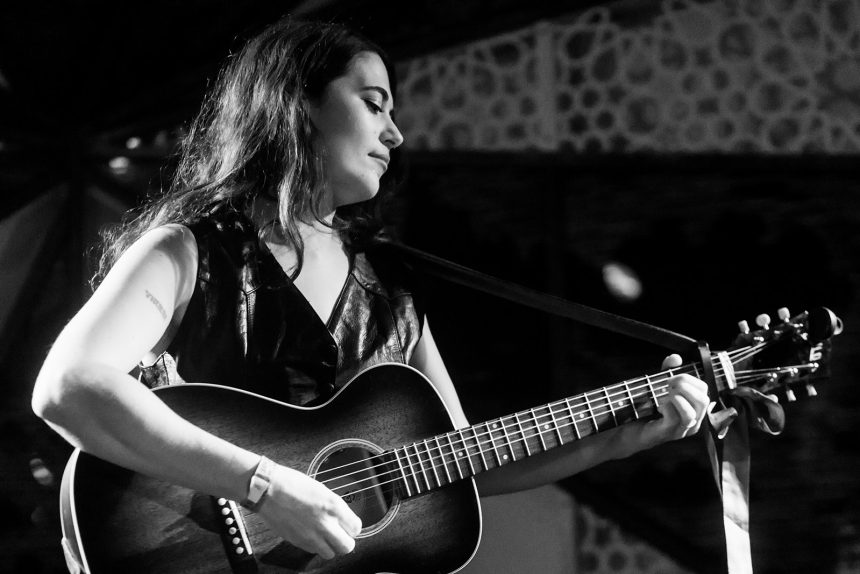Folk music is one of those styles of music that really defies time. We tried not to reuse too many of the same ’60s/’70s reference points in the reviews on this list, but it’s so tempting because great folk music often transports you back to an era that you can barely remember or never experienced in the first place. That said, folk music also continues to be a vital way for artists to express themselves because it truly never goes out of style. Sometimes an acoustic guitar is all you need to tell your story, and the best folk albums are the ones that feel fully present, the ones that capture singer/songwriters in the middle of a raw, real moment.
Every year is a great year for folk, and we’ve put together a list of 10 folk albums from 2023 that we think are not to miss. Read on for the list, in alphabetical order…

Allegra Krieger – I Keep My Feet On The Fragile Plane
Double Double Whammy
A student of the ’70s-era folk of Joni and Judee, Allegra Krieger’s songs shine with just the warmth of her voice and strummed guitar alone, and I Keep My Feet On The Fragile Plane is fleshed out by horn arrangements that only add to them even more. An observant songwriter, she recounts vivid scenes from New York City, where 5th and Avenue A “smelled like piss and garbage” (“Lingering”), to Los Angeles, where she says she wrote “Nothing In This World Ever Stays Still” “in a tumultuous time in my life” spent there. Her way with words is as deft as her way with melodies and mannerisms, making for pin-drop moments and songs that stand tall next to timeless classics.

H.C. McEntire – Every Acre
Merge
Every Acre, the third solo album by Mount Moriah’s H.C. McEntire, is informed by grief and loss but it’s also one of H.C.’s warmest, most welcoming albums yet. Over a backdrop that weaves between country, folk, and rock, H.C. tells personal tales in her world-weary wail, and there’s just as much emotion in her voice as there is in the sprawling, Crazy Horse-esque guitar solos. Supporting roles come from S.G. Goodman and Indigo Girls’ Amy Ray, who sing backup on “Shadows” and “Turpentine,” respectively, and H.C.’s ace band helps give these songs exactly the kind of relaxed, earthy backdrop that they need without doing anything too fancy–just letting H.C.’s strong, impactful songwriting shine.

Helena Deland – Goodnight Summerland
Luminelle / Chivi Chivi
On her 2020 debut, Montreal’s Helena Deland took an electronic approach to the singer-songwriter genre, but for its follow-up she unplugged and fully embraced her inner folkie. Named for the small town in British Columbia where she was born, Goodnight Summerland is a step sideways and up, a gorgeous tribute to her mother who died in 2021, and the most impressive showcase for her stunning, expressive voice yet. Working with producer Sam Cohen and using mostly acoustic instrumentation, Deland crafts songs as lush and bucolic as her memories of her childhood home — shades of Sufjan Stevens at times — and even if you’re not following her words, the melodies, arrangements and that voice might still make you verklempt. As Helena noted when the album was announced, “Music said it better than words could.” [Bill Pearis]

Jana Horn – The Window Is The Dream
No Quarter
Like her great 2022 debut LP Optimism, Jana Horn’s The Window Is The Dream channels the cultishly loved ’60s/’70s folk music of artists like Sibylle Baier, Judee Sill, and Leonard Cohen. It’s just a little bigger and cleaner sounding than its predecessor, but for the most part Jana doesn’t fix what ain’t broke. This very specific style of folk music never seems to go out of style, and Jana does it very, very well.

Julie Byrne – The Greater Wings
Ghostly International
Julie Byrne didn’t only create a beautiful album informed by the loss of a pivotal creative partner and friend with The Greater Wings; she also found the resilience to move beyond the tragedy to the life and chosen family waiting for her there. That spirit is embodied in these songs, which take the bare-bones folk sensibility of her previous releases and infuse it with lush, stirring arrangements, intermingling with the otherworldly poetry in her lyrics. She incorporates details both cosmic and mundane, from drops of blood on a bed sheet in “Conversation is a Flowstate” to a “distant galaxy moon” and the “tilt of the planet” in the title track. Grief casts a long shadow, transforming everything it touches, but Byrne is working through the pain with her community beside her; “healing can be heartbreaking, it’s alright,” she sings on “Flowstate.” “I am by your side.” [Amanda Hatfield]

Kara Jackson – Why Does the Earth Give Us People to Love?
September
A former National Youth Poet Laureate, it should come as no surprise that Chicago singer/songwriter Kara Jackson has a way with words. A song about an ex becomes “Damn, the dickhead blues.” Another begins, “Every man thinks I’m his fucking mother.” When Kara grieves the death of a friend from cancer on the title track, the question is “Why does the earth give us people to love then give them a sickness that kills?” She’s blunt, poetic, and conversational all at once, with a perspective and a delivery that often sits in stark contrast to the mellow folk music stylings beneath her, which are fleshed out with ornate arrangements and help from fellow Chicago musicians NNAMDÏ, Kaina and Sen Morimoto. Whether it’s the in-depth storytelling of the eight-minute “rat” or an attention-grabbing minute-long gem like “therapy,” this album lands with so much impact.

Lankum – False Lankum
Rough Trade
For years, Dublin’s Lankum have been the rightful heirs to the throne once occupied by the likes of The Pentangle and Steeleye Span, and their fourth album False Lankum is their biggest breakthrough yet. A mix of traditionals and originals written in the style of traditional British and Celtic folk music give the album a centuries-old feel, which Lankum then flesh out and modernize through psychedelia, drone, and a dark doominess that’s made Lankum a favorite within metal communities as well as folk music ones. It’s rare for an album this steeped in tradition to sound this startling.

Maple Glider – I Get Into Trouble
Partisan
With her sophomore album I Get Into Trouble, Australia’s Maple Glider (aka Tori Zietsch) has released one of the most stirring, emotionally devastating folk albums of the year. With timeless, ethereal stylings that exist in the lineage from Joni Mitchell and Judee Sill to Angel Olsen and Weyes Blood, Maple Glider tackles such topics as religion, sexual abuse, and loneliness in ways that leave you hanging on every word. When she contends “So I’ve been in the church making sure no one’s looking up my skirt but I do not feel safe here” on “Dinah” or laments “Sometimes my own body doesn’t feel like my body” on “Don’t Kiss Me,” she turns personal pain into magnetic choruses, making for some of this year’s most arresting musical moments.

Maria BC – Spike Field
Sacred Bones
Maria BC’s second album is a major step up and out, sonically, from last year’s relatively spare Hyaline which was made in their bedroom while trying not to disturb roommates. Spike Field was recorded in a friend’s house with no worries of waking anyone up and it shows, with Maria letting their classically trained mezzo-soprano pipes fly free across equally gossamer arrangements. This is still “ambient folk” but it stretches across the horizon. The nylon string guitars and detuned piano wash over you like waves, as synthesizers swell up from below the earth. The album may have been named after giant thorny granite structures designed to warn people against nuclear waste radiation that will last thousands of years, but this Spike Field is warm and inviting. [Bill Pearis]

Meg Baird – Furling
Drag City
Meg Baird’s featherlight voice and equally delicate guitar style are more than enough to carry albums, and have done so in the past, but on Furling she really lets her abilities as a multi-instrumentalist shine. Working as usual with her partner and Heron Oblivion bandmate Charlie Saufley, Meg plays nearly everything herself, including guitar, drums, vibraphone and a wide array of keyboards — that harp is Mary Lattimore of course — without songs ever feeling busy or crowded. She even steps on the dancefloor on the conga-fueled “Will You Follow Me Home” which feels like a cross between Vashti Bunyan and Curtis Mayfield. The airy arrangements allow her voice to fly even higher, making for one of the most immediate, varied albums of her two-decade-plus career. [Bill Pearis]
—
SEE ALSO:
—
Top photo of Maple Glider by Amanda Hatfield from The Sultan Room in December. More here.









